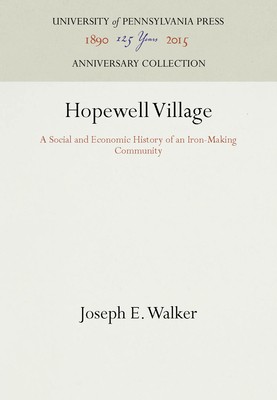
- We will send in 10–14 business days.
- Author: Joseph E Walker
- Publisher: University of Pennsylvania Press Anniversary Collection
- ISBN-10: 0812274741
- ISBN-13: 9780812274745
- Format: 14 x 21 x 2.9 cm, hardcover
- Language: English
- SAVE -10% with code: EXTRA
Reviews
Description
Before 1840 the American iron industry consisted in the main of small furnaces obliged by their need of the charcoal they used for fuel to locate in areas of heavy forest. Around these isolated furnaces grew communities of workers and their families, and of the farmers and service people who supplied their needs. In hundreds of forest clearings there could be found rural industrial settlements as distinctive in form and as important in product as the New England town or the Southern plantation. Hopewell Village tells the story of one such community, which, from 1771 to 1883, made iron in Southern Berks County, Pennsylvania.
What little has been written about the iron villages has concentrated largely on the techniques of furnace operation. This book is concerned with the lives of the people of the iron plantations, from the wealthy ironmaster to the youngest indentured servant, and how they interacted with each other and with the outside world in work, religion, education, and play. Special attention has been given to the lives of minorities.
While every part of the book is documented for the scholar-reader, the style of writing is plain enough to be read with meaning by those who have little background in the techniques either of the iron industry or historiography. Containing much original source material, tables, tabulations and numerous photographs, Hopewell Village should be of interest to students of industrial history, transportation, labor relations, and race relations, as well as to the general reader of American history.
EXTRA 10 % discount with code: EXTRA
The promotion ends in 16d.23:15:24
The discount code is valid when purchasing from 10 €. Discounts do not stack.
- Author: Joseph E Walker
- Publisher: University of Pennsylvania Press Anniversary Collection
- ISBN-10: 0812274741
- ISBN-13: 9780812274745
- Format: 14 x 21 x 2.9 cm, hardcover
- Language: English English
Before 1840 the American iron industry consisted in the main of small furnaces obliged by their need of the charcoal they used for fuel to locate in areas of heavy forest. Around these isolated furnaces grew communities of workers and their families, and of the farmers and service people who supplied their needs. In hundreds of forest clearings there could be found rural industrial settlements as distinctive in form and as important in product as the New England town or the Southern plantation. Hopewell Village tells the story of one such community, which, from 1771 to 1883, made iron in Southern Berks County, Pennsylvania.
What little has been written about the iron villages has concentrated largely on the techniques of furnace operation. This book is concerned with the lives of the people of the iron plantations, from the wealthy ironmaster to the youngest indentured servant, and how they interacted with each other and with the outside world in work, religion, education, and play. Special attention has been given to the lives of minorities.
While every part of the book is documented for the scholar-reader, the style of writing is plain enough to be read with meaning by those who have little background in the techniques either of the iron industry or historiography. Containing much original source material, tables, tabulations and numerous photographs, Hopewell Village should be of interest to students of industrial history, transportation, labor relations, and race relations, as well as to the general reader of American history.


Reviews